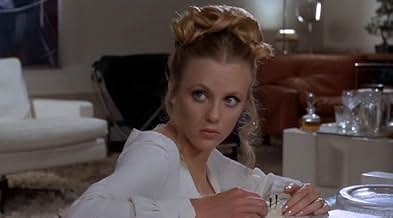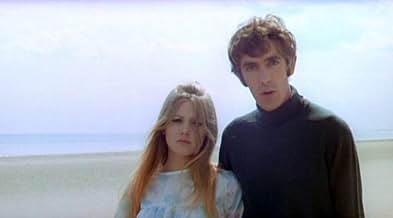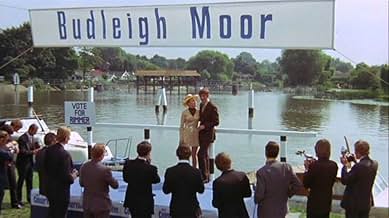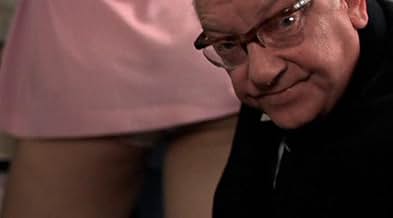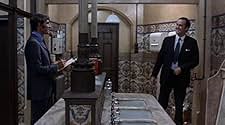Aggiungi una trama nella tua linguaFresh-faced young Michael Rimmer worms his way into an opinion poll company and is soon running the place. He uses this as a springboard to get into politics, and in the mini-skirted, flared... Leggi tuttoFresh-faced young Michael Rimmer worms his way into an opinion poll company and is soon running the place. He uses this as a springboard to get into politics, and in the mini-skirted, flared-trousered world of 1970 Britain, he starts to rise through the Tory ranks.Fresh-faced young Michael Rimmer worms his way into an opinion poll company and is soon running the place. He uses this as a springboard to get into politics, and in the mini-skirted, flared-trousered world of 1970 Britain, he starts to rise through the Tory ranks.
- Regia
- Sceneggiatura
- Star
Recensioni in evidenza
With its amazing cast of contemporaneous British comedy actors and a script by Peter Cook, John Cleese and Graham Chapman, the film should have been a satirical classic. The fact that it isn't, and indeed has virtually disappeared, is mainly due to the very brilliance of its creators. The sketch-show dynamic and satiric insight with which they dominated television comedy and theatre revue does not translates well to the cinema. Here it appears as an unfocused and fragmented ramble.
Rather than create a set of rounded characters which might withstand big-screen scrutiny, Cook and company resort to what they know best - caricatures. Accurate caricatures though they are, these are not 'people' but conduits and Aunt Sallys for the film-maker's understandable exasperation.
Peter Cook never looked so urbane and strikingly handsome as Michael Rimmer: a charming manipulator whose every utterance is a covert announcement of his smoothly diabolical strategy. Cook plays the role like a kind of malevolent mannequin. Grinning and mechanical. It was a deliberate move on his part and quite brave. But the viewer soon craves for him to break cover, show a crack in the veneer, display some vulnerability to connect with. It never happens. Rimmer is no Richard III. Maybe that's the way Cook regarded such power-players: passionless shells of men with nothing but their ambition to drive them. Unfortunately, the film itself takes on these very aspects and becomes heartless and mechanical.
The script is also not quite funny enough. The intimidation of writing for the big screen seems to have severely compromised the talents of the writers. Many of the jokes are forced and frequently fall back on tits-and-arse sight-gags - an unhappy irony as the film is highly critical of the use of sex by advertisers to sell useless products. A severe case of "having your cake and eating it".
A lot of the minor players ham it up to grab laughs in that peculiarly loud, desperate, English rep-company manner. However, it is a truly wonderful thing to behold Peter Cook, Denholm Elliot and the great Harold Pinter (as a fantastically smarmy TV talk-show host) appearing in the same frame trying to out-smarm each other. It's a three way draw. Brilliant.
Yes, there are some good things. Kevin Billington has a nice eye for composition, but, perhaps understandably, he can't do a thing with the fractured narrative. Alex Thompson's camera-work is excellent and imparts a sense of real cinema. The film's insight into the cynical manipulation of the media by politicians seems even more prescient today. But ultimately, it all fails to gel.
Perhaps it came too late in the cycle of British satirical comedy to really get everyone's blood moving. Cleese and Chapman moved on rapidly to the ground-breaking surrealism of Monty Python, and David Frost, the film's co-producer, dived headlong into a lucrative career as a talk-show host and professional jet-setter. But Cook's hopes for becoming a major movie star were destroyed by the film's failure. Apart from sporadic periods of greatness (re-uniting with Dudley Moore etc), he basically drank himself to death over the next twenty-five years. A sad conclusion to a great comedian's life.
The film is worth seeing if for no other reason than to witness a snapshot of British comedy before it flew into a very different orbit.
It was way ahead of its time. Both funny and serious. The fact that it has not been available suggests that some of its points are too close to the truth for the 'establishment.'
I would love to see the scene again when the capsule is hidden in the hankie. He is meant to smash it which will cause a tear. It doesn't quite go as intended.
A brilliant film.
As the movie begins, Peter Cook starts following people at an ad agency, writing things down on a clipboard and introducing himself to everyone as Michael Rimmer. He claims to be an employee, yet he has to introduce himself to every single person at the company.
Soon Cook is a pollster, then a politician, each step preceding from the last, each move built on deceit in a world that accepts deceit as the norm, and Cook as one of them.
Cook is a mysterious character. We can see him manipulating events and working his way up the food chain, but there's never a sense of what it's all for. He seemingly just wants power, but it's never enough, and he never uses it for anything except gaining more power. This is interesting, but at the same time its distancing, leaving one intellectually engaged but emotionally disinterested.
The movie is at its best when it lays out the manipulations, as when a politician practices for a speech in an odd way, and then we see the speech and exactly what the rehearsal was all about.
The film is also interesting as a time capsule. It's strange to watch any non-war movie that is so man-heavy. While many movies of the time should men exclusively in business roles, there is usually a counterbalance of women in roles of emotional support. But in a movie all about power made at a time where only men had power, women are pure decorative, used for sex jokes and gratuitous nudity. This is true to what was going on at the time, although in a satire one always notices where the creators seemingly accept the status quo, and here there seems to be no thoughts for the ladies.
The movie didn't do well, but then, how often does satire do well? If you're one of those rare people who are drawn to satire this is a very worthwhile film.
Peter Cook's unemotional performance in the title role has drawn criticism, even from the man himself but I think it is just right. I have met people in real life who are just as wooden as Michael Rimmer, with nothing behind their eyes. I find the character menacing and I think Cook has a great screen presence, even though this movie apparently ruined his career! The wonderful Vanessa Howard plays Rimmer's wife; I think she should have been a huge star but at least a few of her movies are now available on dvd. Arthur Lowe does a great turn in a supporting role as the lazy and envious Ferret, and many other well known English actors appear, including Denholm Elliott and Dennis Price.
The Rise and Rise of Michael Rimmer is a comedy but a decidedly black one and all the better for it. There is a shortage of characters to relate to and root for which shows how well it reflects the world of politics but this will have contributed to it being so quickly forgotten when it first came out. At least there have been many favourable reviews since the dvd release.
As Rimmer gains more and more personal power, we see a Britain decaying at the seams in a sea of corruption - from the dim humbug makers with their sexy ad campaign to the would-be PM with planted questions at party conference. Supporting roles are judged well (Denholm Elliott, John Cleese, Arthur Lowe, Ronald Fraser in particular), while Cook himself looks the part, smirking and smart-suited, interfering in a cosy world of middle-aged execs and politics in need of a shake.
There's a lot going on here in a Britain stood still - and it makes for a very entertaining film.
Lo sapevi?
- QuizSir Eric Bentley is inspired by the late British Conservative politician Enoch Powell, who made the famous "Rivers of Blood" speech about immigration to the UK. Bentley repeats a piece of gossip about an old lady from an embarrassingly unreliable source - much as Powell had. Bentley mentions Powell by name at the end of the speech.
- BlooperDuring the sex survey scene, Michael Bate's character exclaims that the last time he and his wife made love was Tuesday June 3rd 1953 and it was the Coronation of HM Queen Elizabeth II that 'got her going'. Whilst he may remember the occasion with some nostalgia, he doesn't remember the day as June 3rd 1953 fell on a Wednesday.
- Citazioni
Mrs. Ferret: Have you been fired?
Ferret: [brushing it off] Fired?
[laughs]
Ferret: Hahaha! Fired? Hahahaha
[more nervous now]
Mrs. Ferret: Then why is the car for sale?
[we see the car through the house window; in the side window there is a crudely written sign saying FORSALE]
Ferret: Oh that? That's a mistake. That's one of Rimmer's cockups. That should read Fors Ale. A new beer we're advertising.
[as giving a slogan]
Ferret: Fors Ale - keeps you hearty and hale.
Mrs. Ferret: Well I've never heard of it.
Ferret: And you may never! Very hush hush.
- ConnessioniFeatured in Omnibus: Some Interesting Facts About Peter Cook (1995)
I più visti
- How long is The Rise and Rise of Michael Rimmer?Powered by Alexa
Dettagli
- Data di uscita
- Paese di origine
- Lingua
- Celebre anche come
- Взлёт и подъём Майкла Риммера
- Luoghi delle riprese
- Porchester Halls, Queensway, Bayswater, Londra, Inghilterra, Regno Unito(party conference)
- Azienda produttrice
- Vedi altri crediti dell’azienda su IMDbPro
- Tempo di esecuzione1 ora 34 minuti
- Mix di suoni
Contribuisci a questa pagina


